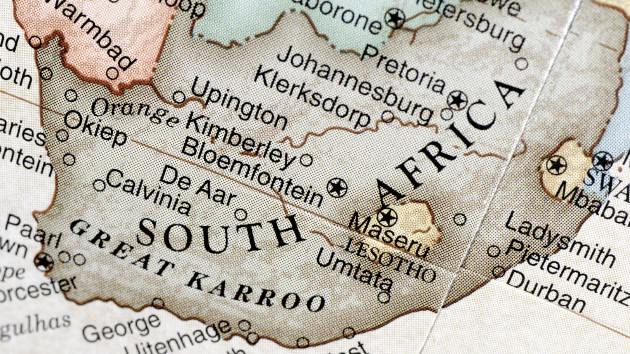Search for tiger on the loose in South Africa
Written by ABC Audio All Rights Reserved on January 30, 2023

(LONDON) — South African authorities were attempting to capture a young tiger on the loose in a Johannesburg suburb on Monday.
The 9-month-old female tiger was captured on surveillance video early Monday while circling a parked car outside an office building in the town of Edenvale, northeast of South Africa’s largest city. The animal was also reportedly spotted roaming a residential area.
South African security company SOS Security said in a Facebook post later Monday that the tiger was successfully captured, sedated and taken to a sanctuary. However, the Edenvale SPCA said it has yet to receive any evidence or proof of such claims and thus urged local residents to keep “animals and children indoors and safe until we can provide feedback.”
“We will not confirm that this tiger is safe, alive or at a place of safety until we have the facts,” the Edenvale SPCA said in a Facebook post on Monday evening. “We can assure our community that we will not leave matters there. This matter will be investigated and an update will be given to our community. This tiger deserves nothing less.”
SOS Security did not immediately respond to ABC News’ request for comment.
It was unknown where the big cat came from and whether it was an escaped pet.
It was the second time this month that a tiger has been on the loose in South Africa.
About two weeks ago, another female tiger escaped from her enclosure on a private property in Walkerville, southwest of Johannesburg. The tiger, named Sheba, reportedly attacked and injured a man and killed two dogs. After several days, Sheba was captured and euthanized, sparking fury and reviving the debate over South Africa’s controversial big cat industry.
The country is one of only a few in Africa where the commercial captive breeding, keeping, hunting and trading of tigers is still allowed. The industry was born out of the nation’s legal practice of commodifying its captive-bred lions at every stage of life, from birth to death.
There are hundreds of private and government-owned facilities across South Africa that are legally breeding and raising thousands of lions as well as other big cat species, sometimes in tiny enclosures and unsatisfactory conditions. Cubs are separated from their mothers just days after birth, so the adult females can be continuously bred. The animals are then hand-reared so they grow up to be tame and used to humans. Cubs are used in petting attractions while they’re very young and small. Adolescent lions are used in other tourist activities, such as walking with lions.
When they get too big to safely interact with tourists, the lions are either recycled back into the breeding industry or sold to other facilities where they will be gunned down in canned trophy hunts or killed for their bones. Lion bones, teeth and claws are typically shipped to East and Southeast Asia, both legally and illegally, where they are often used in jewelry or falsely advertised as tiger parts for luxury products.
In 2021, the South African government announced plans to end its multimillion-dollar captive lion industry and said it won’t oppose the international ban on the rhinoceros horn and elephant ivory trade. Since then, animal rights organization World Animal Protection said it has received intelligence reports that some lion farms appear to be shifting operations to tigers and lion-tiger hybrids.
A 2022 report by global animal welfare organization Four Paws found that a total of 359 live tigers and 93 tiger parts were exported from South Africa between 2011 and 2020, primarily to Vietnam, China and Thailand — “all renowned hotspots for demand in tiger parts and illegal trade in tigers and tiger parts.”
An estimated 12,500 tigers live in captivity around the world, compared with 4,400 that remain in the wild, according to a 2020 report by the United Nations Office on Drugs and Crime.
The number of captive tigers in South Africa is unknown.
The South African Department of Forestry, Fisheries and the Environment set up a team in late 2022 to look into a possible ban on tiger breeding and is expected to start work this year, a spokesperson told AFP earlier this month. ABC News has reached out for comment.
Copyright © 2023, ABC Audio. All rights reserved.






